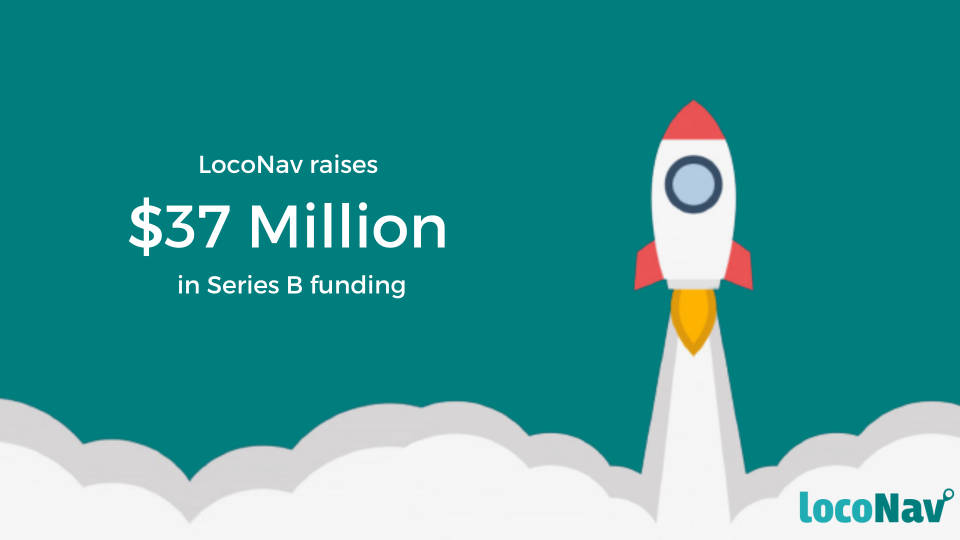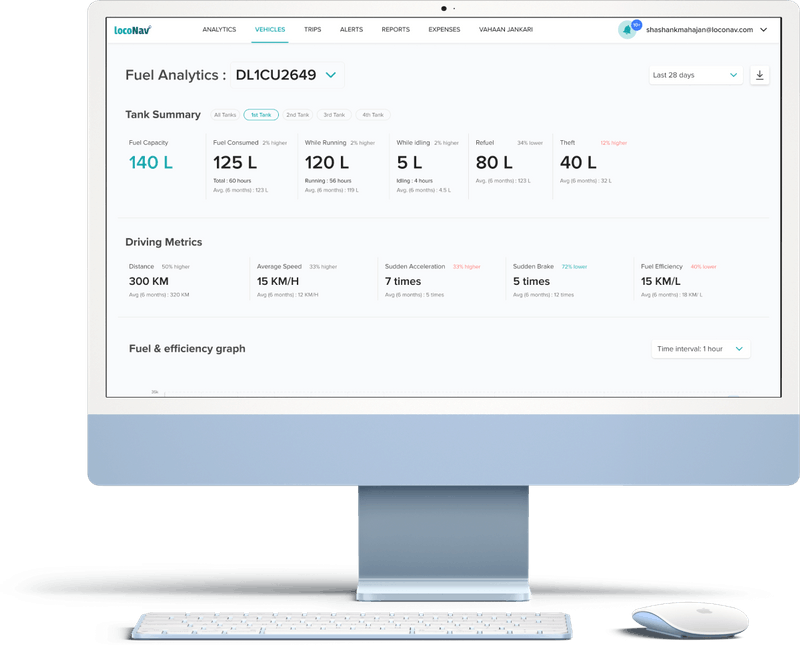The importance of fleet management software has become more important than ever – as we realized during the pandemic – it’s crucial to not disrupt the supply chain amidst the lockdown. That’s why the space has a lot of competition too with startups aiming to solve this in a different manner. LocoNav is no different. Started in 2016, the startup has continued to scale new heights and recently secured a $37million Series B round to continue its growth. We managed to speak to its co-founders Shridhar Gupta and Vidit Jain about their journey, LocoNav’s evolution, and what’s next.
PS: the interview has been edited for the sake of brevity.

Table of Contents
1. Before we talk about LocoNav, could you share your journey into the world of SaaS?
We both share a passion for purpose-led technological innovation. Since the beginning of our partnership, first as colleagues at ClearTax and then as business partners, our goal has been to build a global, scalable business solution powered by technology that has an incrementally positive impact on life. We started out exploring opportunities in the B2B space and our first venture was building a freight marketplace.
Over the course of time, we realized that the problem was larger than booking a consignment. An industry that manages billions of dollars worth of goods had rudimentary coordination systems which made even fleet tracking and driver management difficult and inefficient. The fleet owner’s only way of staying in touch with the driver was by calling him. If the driver was unreachable – either deliberately or for reasons beyond his control – the owner had no way of knowing or mitigating any financial losses that would occur. Conversely, if the driver had a flat tire or fuel theft, and the owner hadn’t given enough cash for contingencies – which most owners neither have, nor give – the trip would be in financial losses.
We realized that not just in India, but across global emerging markets, over a 250million commercial vehicle owners and drivers don’t have easy (or any!) access to technology and solutions to run their vehicles efficiently and save running costs. Hence, LocoNav was born in 2016 to democratize access to fleet-tech for millions of fleet owners and drivers across high-growth emerging markets. For us, each commercial vehicle is a business in itself with its own P&L. Every mile it travels brings revenue, and with it, an associated cost. This commercial vehicle is the atom of LocoNav. We leverage the power of IoT and AI to center all our efforts around this atom so that we can bring the enormous amounts of data generated from the vehicle onto a single platform. This data enables the safety of the driver, vehicle, and the freight it is carrying and improves business efficiency for the fleet owner. All of this, in turn, improves the lives and livelihoods of everyone in the industry, benefits the larger logistics and supply chain ecosystems, and positively impacts climate sustainability.
2. What gaps did you see in the market before launching LocoNav?
A lot of software that was available in 2015-16 was from the 90s. These were disconnected systems and fundamentally, fleet operators spent a lot of time figuring business on pen and paper. For an industry that serves as the backbone to the global economy and impacts our day-to-day lives, it never really benefited from modern software and data in the way that the rest of our economy has in markets like India. Fleet owners spent their entire day on phones tracking drivers and handling cash transactions. Due to the prohibitive pricing or hardware needs of the software, or access to modern devices, or network issues even, most of the new-age products being developed in Western markets were beyond the reach of even larger fleet operators.
3. Could you share how LocoNav has evolved since its inception in 2016?
We began in 2016 as a full-stack and one-stop fleet-tech solutions platform. We are device agnostic and already compatible with over 2,200 devices from the simplest GPS location trackers to completely integrated Fleet Management Solutions like LocoNav ADAS – advanced video telematics & driver safety solution completely bundled into a one-stop offering. Our software solution is already available in over 30+ countries and we will enter new ones soon.
Our India leadership comes on the back of a unique combination of hardware, software, and telematics that then leverages the half a million vehicles we are present on to offer value-added services and solutions to fleet owners like LocoNav Insuretech, LocoNav Pay – an easy toll and prepaid cards payment solutions to eliminate the need for petty-cash management, and LocoNav RTO – a one-stop destination that helps in regulatory compliance management. We are rapidly expanding all of these and more to existing and new countries across APAC and EMEA.

We recently raised $37million in Series B funding from Quiet Capital, Anthemis Group, Sequoia Capital India, RIT Capital Partners, Uncorrelated Ventures, Village Global, and other leading investors. We have previously raised $10million in prior rounds and our total amount raised stands at ~$47million. We are focused on building the world’s largest network of connected commercial vehicles and leveraging that network to build a full-stack fleet services platform that has a positive impact on the lives and livelihoods of everyone in this ecosystem.
4. Which are your biggest markets, and how many customers do you have now?
Our fleet tech company has been continuously growing and we are present in over 30 countries where more than 5million vehicles have used at least one of LocoNav’s products and services to improve safety and business efficiency. While India is our primary market, we are also venturing into emerging markets like South Africa, Kenya, Malaysia along with others. We aim to replicate our success in the subcontinent across global emerging markets and help to build additional partnerships and channels, make strategic acquisitions, as well as establish a local presence in key geographies. We are also strengthening our tech muscle by building technology and data science teams across San Francisco, Gurugram, and Bengaluru.
5. How does LocoNav stand out from the competition?
In developed nations, the fleet management industry has become very large over the past decade. Players in this market have started offering sophisticated tech to drivers and fleet owners who are tech-savvy, enjoy better roads and networks, and overall are more organized. However, in global developing markets, there aren’t many large players, and we see ourselves as the first mover there. We are catering to fleet owners and operators who are not using any kind of tech in these markets or have limited access to it. In emerging markets, the fleet management industry is fragmented. There are large enterprises hoping to get efficiencies of tens of millions of dollars by using the right fleet management solutions and there are small business owners with 2-3 vehicles for whom the commercial vehicles are their sole livelihood. Efficient fleet management will mean a better quality of life for their families and future generations. We don’t believe that we are competing with another company. The need of the hour is to build this category in a comprehensive manner. It is about bringing the fleet owners resorting to old-school devices and software to our world of accessible, world-class technology-led solutions that are created with their reality in mind.
6. Could you shed a light on your marketing strategy?
We aim to bring a radical change in emerging markets where no more than 30 percent of the 250million commercial vehicles use any form of fleet management tech. This is because the end customer perceives using fleet technology as an additional cost rather than a driver of business growth. To build a democratized and accessible fleet-tech brand in these markets our first step is to understand market-specific challenges and motivations to build an awareness campaign. Our multidisciplinary marketing team headed by Seema Chawla (CMO, LocoNav), is enabling this by taking cues from proven B2C consumer marketing principles and integrating fleet-tech into mainstream conversations.

Current communication and marketing efforts are conventional and technical jargon-heavy. Most fleet owners and drivers come from varying educational backgrounds, often with limited understanding of the jargon, or speak local languages. We want to solve this with benefit and purpose-driven marketing. Our marketing strategy will unlock consumer engagement opportunities for the B2B tech category. With simplified and customized communication, we will enrich the customer experience at every touchpoint of the fleet owner and driver’s consumer journey. The ultimate goal is to enable them to discover the full stack of LocoNav’s fleet management solutions that will bring safety and profitability to their business.
7. How has the ongoing pandemic affected LocoNav – both in terms of users of your software and the business itself?
When COVID-19 struck, we faced a situation never seen before. From innovating and brainstorming in our meeting rooms we suddenly found ourselves in our living rooms and bedrooms managing personal and professional lives. Several commercial vehicles we serve are part of the backbone of the global economy. We had to fundamentally change how we work to continue empowering fleet operators and drivers across the globe. Covid-19 caused severe disruptions in the logistics industry because of the heavy restrictions on the movement of goods and people. However, technological adoption in this sector has accelerated due to the challenges being faced by the supply chain during this period.
We had to ensure that our supply chains functioned properly and after a small hiccup, we were up and running. Our Series B round of funding through different investors showed their faith in the brand even during the pandemic as we were EBITDA positive during that time. We had to make sure that we invest in data technologies and fleet management software for higher efficiency in warehouse stock management, live tracking of the fleet, and curating the flow of operations even as the number of fleets hitting the road increased.
8. Could you share your biggest learnings of building a global product out of India?
We both want to give the world a global, scalable solution on the back of accessible technology that will have an incremental positive impact on life as we know it. Education and awareness are an ongoing effort with a large enterprise customer network, especially in emerging markets. We spend a lot of time ensuring that our customers maximize value from the product and insights. To set up any form of B2B solution in emerging markets is to operate in very price-sensitive customer cohorts, therefore, it is important to clearly explain the value proposition and ROI to the customer. While the volume opportunity is massive, ARPU is substantially lower than mature developed markets, so it takes some time to arrive at optimum price discovery. From an operations perspective, it is imperative that we build multiple post-sales touchpoints and a network that can cater to every location in every market we operate in – for example, in India, we are available in every pin code. We are also expanding our engineering and R&D teams across the globe to drive actionable insights from massive amounts of data. We believe that everyone has a purpose and calling in life and the most successful companies, therefore, are those that are built out of that purpose.
9. Which are your favorite SaaS software out there?
There are so many innovative SaaS offerings in the market introducing efficiency into every aspect of a business. However, if we had to pick our favorites, they would definitely be Figma, Slack, GitHub, and Mixpanel.
It’s interesting to see how these companies leveraged the power of innovation to enable access – access to powerful design tools for everyone (Figma), access to organized spaces for better productivity (Slack), access to collaborative coding (GitHub), and analytical insights in real-time about how people interact with your products (Mixpanel). At their core, they are building for the benefit of the larger ecosystem they operate in and are enabling positive impact with ease of access.






